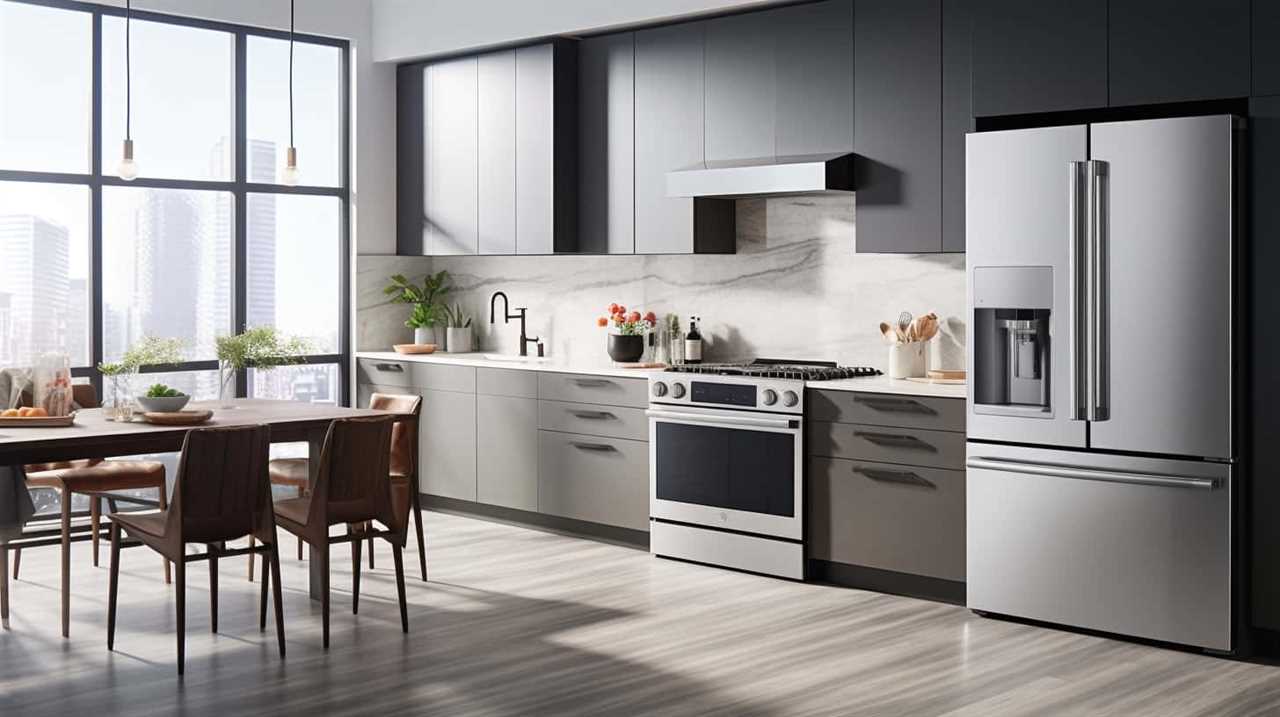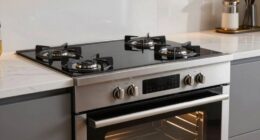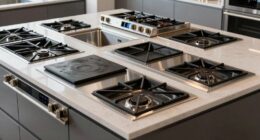When starting the process of purchasing a home, there are numerous factors to take into account. One important consideration is whether or not appliances are included in the sale. It can feel like discovering the final piece needed to make our dream home complete.
In this article, we will explore the importance of understanding the seller’s policies, location-dependent practices, and specific terms of the sale. We will also discuss the appliances typically included, warranties, repairs, financing options, and the choice between DIY installation and seeking professional advice.
Key Takeaways
- Hidden costs associated with appliances
- Importance of understanding seller’s policies regarding appliance inclusion
- Negotiating appliance inclusions based on condition, age, and value
- Recognizing location-dependent practices and variations in appliance inclusion
Importance of Considering Appliances
We strongly believe that considering the appliances included in a house purchase is of utmost importance.
While the initial cost of buying a house may seem daunting, it’s essential to evaluate the hidden costs associated with the appliances. Appliances such as refrigerators, dishwashers, and washing machines have a limited lifespan, and replacing them can be expensive.

By understanding the expected lifespan of these appliances, buyers can estimate the potential costs they may incur in the future. Additionally, it’s crucial to consider the condition of the appliances and whether they’ve been well-maintained by the previous owners. This can provide insight into the potential longevity and reliability of the appliances.
Considering these factors can help buyers make informed decisions and avoid unexpected expenses. Understanding the seller’s policies regarding the appliances can further aid in negotiations and provide clarity on what’s included in the purchase.
Understanding Seller’s Policies
When it comes to understanding a seller’s policies regarding appliances, there are a few key points to consider.
First, it’s important to know the guidelines for appliance inclusion in the sale of a house. This can vary from seller to seller, so it’s crucial to clarify this aspect early on.

Additionally, negotiating appliance inclusions is a common practice, so being aware of your options and having a clear understanding of what you want can help in these discussions.
Lastly, it’s essential to be cautious of any potential hidden fees or costs associated with the inclusion of appliances, as they can impact your overall budget.
Appliance Inclusion Guidelines
To understand the seller’s policies regarding appliance inclusion, it’s important to review the guidelines. These guidelines outline the expectations and requirements for both sellers and buyers when it comes to appliances.
One important aspect to consider is the importance of warranties. Sellers may include appliances with existing warranties, providing buyers with added protection and peace of mind.

Understanding the lifespan of appliances is also crucial. Sellers may choose to include appliances that are relatively new, ensuring that buyers won’t have to replace them in the near future.
However, it’s essential for buyers to carefully review the guidelines to determine if the included appliances meet their specific needs and preferences.
Negotiating Appliance Inclusions
Typically, sellers frequently outline their policies regarding appliance inclusions, providing buyers with a clear understanding of what to expect during negotiations. Understanding these policies can help buyers avoid hidden costs and employ effective negotiation tactics.
Here are four key points to consider:

- Read the listing carefully: Sellers often specify which appliances are included in the sale. Pay attention to the terms and conditions mentioned in the listing description.
- Research the market: Understanding local market trends can give you an idea of what appliances are typically included in a house sale. This knowledge can help you negotiate more effectively.
- Assess the condition of the appliances: If the appliances are included, carefully evaluate their condition. This evaluation can help you determine if negotiating for replacements or repairs is necessary.
- Be prepared to negotiate: Use your understanding of the seller’s policies and the condition of the appliances to negotiate for the best deal. Consider factors such as the age and value of the appliances when determining your negotiation tactics.
Hidden Appliance Inclusion Fees?
Hidden appliance inclusion fees can catch buyers off guard, so it’s important to understand the seller’s policies regarding these fees.
When purchasing a house, buyers often assume that appliances are included in the sale. However, some sellers may charge additional fees for including appliances in the deal. These hidden fees can vary depending on the value and condition of the appliances.
It’s crucial for buyers to carefully review the seller’s policies and negotiate any potential fees before finalizing the purchase. Another important aspect to consider is the appliance warranties. Buyers should inquire about the warranty status of the appliances and whether it will be transferred to them.
Understanding the seller’s policies and being aware of any hidden fees can help buyers make informed decisions and avoid unexpected expenses.

Location-Dependent Practices
When considering the question of whether appliances are included when buying a house, it’s important to recognize that regional practices may vary. Different locations may have specific norms and expectations regarding what’s typically included in a home sale.
Therefore, it’s crucial for buyers to research and understand the location-dependent practices in the area where they’re looking to purchase a house.
Regional Appliance Inclusion
In our experience, it’s common for appliances to be included in the purchase of a house, but the specific practices can vary depending on the location. Here are some key factors to consider when it comes to regional appliance inclusion:
- Hidden costs: Some regions may include appliances in the purchase price, but buyers should be aware of any potential hidden costs, such as maintenance fees or extended warranties.
- Legal considerations: Different locations may have specific regulations regarding the inclusion of appliances in a home sale. Buyers should consult with their real estate agents or attorneys to understand the legal requirements in their area.
- Market trends: Regional practices can be influenced by market trends. In some areas, including appliances may be a common practice to attract buyers, while in others, it may be less common.
- Negotiation power: The inclusion of appliances can be a negotiating point. Depending on the location, buyers may have more or less leverage in negotiations to include appliances in the sale.
Understanding these regional variations is crucial when buying a house to ensure that there are no surprises or misunderstandings.

Now, let’s explore the varying location-specific practices in more detail.
Varying Location-Specific Practices?
As we delve into the topic of varying location-specific practices in regards to appliances being included when buying a house, it’s important to consider the impact of local customs and regulations. These practices can greatly influence the overall cost and legal implications of purchasing a home.
In some areas, it’s customary for sellers to include appliances such as refrigerators, stoves, and dishwashers as part of the sale. This can be seen as a value-add for buyers, as it saves them the hassle and expense of purchasing these items separately.
However, in other locations, it isn’t the norm for appliances to be included, and buyers may need to negotiate with the seller or budget for the additional expense of purchasing their own appliances.

It’s crucial for buyers to be aware of these hidden costs and understand the legal implications in their specific location before making a decision.
Specific Terms of the Sale
Appliances included in the purchase of a house are subject to specific terms outlined in the sale agreement. When considering the specific terms of the sale, it’s important to be aware of any hidden costs that may be associated with the appliances. These costs could include installation fees, maintenance contracts, or repairs that may arise in the future.
Additionally, legal considerations should be taken into account. It’s essential to review the sale agreement carefully to understand the obligations and responsibilities of both the buyer and the seller regarding the appliances. By being informed about the specific terms of the sale, buyers can avoid any surprises or disputes that may arise later on.
Now let’s delve into the next section, where we’ll discuss the appliances typically included in the purchase of a house.

Appliances Typically Included
Typically, when buying a house, we can expect certain appliances to be included in the purchase. While the specific appliances may vary, there are some common items that are often included. These typically include a stove, oven, refrigerator, and dishwasher. Additionally, a washer and dryer may also be included.
However, it’s important to note that not all houses come with appliances, so it’s crucial to clarify this with the seller or real estate agent before finalizing the purchase.
When it comes to appliances, it’s also important to consider their warranties and energy efficiency ratings. Warranties provide protection against any potential defects or malfunctions, while energy efficiency ratings indicate how much energy the appliances consume, which can impact utility costs. Therefore, it’s worth considering appliances with good warranties and high energy efficiency ratings when buying a house.
Appliances Typically Excluded
When it comes to appliances typically excluded from a house purchase, there are some standard exclusion rules to be aware of. These rules vary depending on the jurisdiction and the specific terms of the sale agreement.

However, it’s important for buyers to know that they have the option to negotiate for the inclusion of appliances in the sale. This can be done by making a strong case for their value and necessity, and ensuring that any agreements reached are clearly stated in writing.
Standard Exclusion Rules
We usually find that some appliances are excluded when purchasing a house. It’s important for buyers to be aware of these standard exclusion rules to avoid any hidden costs and understand the seller’s obligations.
Here are four common appliances that are typically excluded:
- Refrigerator: While it’s commonly expected to be included, sellers may choose to take their refrigerator with them, leaving buyers to purchase their own.
- Washer and Dryer: These appliances are often excluded, requiring buyers to either negotiate their inclusion or purchase their own.
- Microwave: Sellers may choose to take their microwave with them, leaving buyers to provide their own.
- Window Treatments: This includes curtains, blinds, and other window coverings, which are often considered personal property and excluded from the sale.
Understanding these standard exclusions can help buyers plan for additional expenses and negotiate appliance inclusion successfully in their home purchase.

Negotiating Appliance Inclusion
To ensure that appliances are included in the sale of a house, we can actively negotiate their inclusion with the seller. This step is crucial because appliances are often excluded from the sale by default. However, with the right negotiation tactics, we can increase our chances of getting the appliances included.
Here are some hidden negotiation tactics to consider:
- Focus on the overall value: Instead of solely emphasizing the appliances, highlight the value they add to the house as a whole. This approach may encourage the seller to include them.
- Offer alternatives: If the seller is reluctant to include the appliances, propose alternative solutions such as a reduced price or other concessions to compensate for their exclusion.
- Bundle with other terms: Consider bundling the inclusion of appliances with other terms in the negotiation, such as repairs or closing costs. This can create a win-win situation for both parties.
Importance of Written Agreements
It is essential to have a written agreement when purchasing a house, as appliances are typically excluded from the sale. This written agreement serves as a legally binding document that outlines the terms and conditions of the sale, including what’s included and excluded from the purchase. Here are four reasons why a written agreement is crucial in this regard:
- Avoid hidden costs: Without a written agreement, there’s a risk of unexpected expenses related to the inclusion or exclusion of appliances. Clarity in the agreement helps prevent any surprises and ensures that all parties are aware of their responsibilities.
- Protect against legal implications: A written agreement provides legal protection for both the buyer and the seller. It clearly defines the scope of the sale, reducing the chances of disputes or misunderstandings arising later.
- Establish clear expectations: By having a written agreement, all parties involved can have a clear understanding of what’s included in the purchase. This helps manage expectations and avoids any potential disappointments or conflicts.
- Provide peace of mind: A written agreement gives buyers confidence in their purchase by providing a clear record of what they’re getting. It offers peace of mind knowing that all terms have been agreed upon and documented.
With the importance of written agreements established, let’s now delve into the subsequent section about negotiating appliance inclusion.

Negotiating Appliance Inclusion
When negotiating the inclusion of appliances, buyers should clearly outline their expectations to the seller. It’s important to consider any hidden costs associated with the appliances, such as maintenance or repairs. Buyers should also consider the lifespan of the appliances and factor this into their negotiations.
Appliances can vary greatly in terms of quality and durability, so it’s essential to assess their condition and determine whether they’ll need to be replaced in the near future. Buyers should also consider the cost of replacing or upgrading the appliances if they aren’t included in the sale.
Potential Benefits of Included Appliances
One of the major benefits of including appliances in the purchase of a house is that they can save us the time and hassle of shopping for and installing new ones.
Here are four reasons why including appliances can be advantageous:

- Convenience: Having appliances included means we don’t have to spend time researching and comparing different models and brands. It eliminates the need to schedule delivery and installation, allowing us to settle in quickly and focus on other aspects of moving.
- Cost savings: Buying new appliances can be expensive, especially if we opt for high-quality, energy-efficient models. By including appliances in the purchase, we can avoid these upfront costs and potentially save thousands of dollars.
- Hidden costs: When purchasing new appliances, there may be additional expenses such as delivery fees, installation charges, and removal of old appliances. Including appliances in the house purchase can help avoid these hidden costs.
- Resale value: Including appliances can enhance the resale value of the house. Buyers are often willing to pay more for a house with upgraded or included appliances, increasing our chances of a higher return on investment in the future.
Potential Drawbacks of Included Appliances
When considering the potential drawbacks of included appliances in a home purchase, there are two main points to consider.
Firstly, the maintenance responsibilities for these appliances fall on the homeowner, which can be time-consuming and costly.
Secondly, the cost of repairs or upgrades to these appliances can also add up, especially if they’re outdated or in need of frequent repairs.
It’s important for homebuyers to carefully assess the condition and age of the included appliances to determine if any potential drawbacks outweigh the benefits.

Maintenance Responsibilities for Appliances
As homeowners, we take on the maintenance responsibilities for the included appliances, ensuring their proper functioning and longevity. While having appliances included in the purchase of a house can be convenient, there are potential drawbacks to consider.
Here are some maintenance responsibilities and hidden costs that may arise:
- Regular cleaning and maintenance: Appliances require regular cleaning and maintenance to keep them in good working order. This includes tasks such as cleaning filters, descaling, and removing lint build-up.
- Repairs and replacements: Over time, appliances may experience wear and tear, and components may break or malfunction. As homeowners, we’re responsible for arranging repairs or replacements, which can be costly.
- Energy consumption: Appliances can account for a significant portion of a home’s energy usage. Ensuring that appliances are energy-efficient and properly maintained can help reduce utility bills.
- Warranty coverage: It’s important to understand the warranty coverage for the included appliances. Some warranties may have limitations or exclusions, and understanding these can help avoid unexpected expenses.
Cost of Repairs/Upgrades
We take on the potential drawbacks of included appliances when it comes to the cost of repairs and upgrades as homeowners. While having appliances included in the purchase of a house can be convenient and cost-saving initially, it’s important to consider the long-term implications.
One potential drawback is the cost of repairs. If the included appliances are older or in poor condition, they may require frequent repairs, which can quickly add up in terms of cost.

Additionally, if you decide to upgrade the appliances to more energy-efficient or modern models, you’ll need to bear the cost of these upgrades yourself.
It’s important to carefully assess the condition and lifespan of the included appliances before making a decision, as it may impact your overall budget for repairs and upgrades.
Assessing Appliance Quality
To determine the quality of the appliances included in a house purchase, it’s important for us to thoroughly inspect and test them. Here are four key factors to consider when assessing appliance condition and comparing appliance brands:
- Performance: We should evaluate how well the appliances function. Are they efficient and reliable? Do they meet our specific needs and preferences?
- Durability: It’s crucial to examine the build quality and materials used. Are the appliances sturdy and built to last? Will they withstand regular use without frequent breakdowns or repairs?
- Energy Efficiency: We should look for appliances that are energy-saving to reduce utility costs and minimize our environmental impact. Checking for Energy Star ratings can help us determine their efficiency levels.
- Brand Reputation: Researching the reputation of different appliance brands can provide insight into their overall quality and customer satisfaction. Reviews and ratings can be valuable resources in making an informed decision.
Appliance Warranties and Repairs
One important consideration when purchasing a house is the availability of warranties and repair services for the included appliances.

Appliance insurance, also known as extended warranties, provide homeowners with peace of mind by covering the cost of repairs or replacements for appliances in case of breakdowns or malfunctions. These warranties typically extend beyond the manufacturer’s warranty, offering additional coverage for a specified period of time.
It’s essential to carefully review the terms and conditions of the warranty to understand what’s covered and what’s excluded. Additionally, homeowners should inquire about repair services provided by the manufacturer or authorized service centers in case of any issues. Having access to reliable repair services can save homeowners time and money.
Now that we’ve discussed appliance warranties and repairs, let’s move on to the next section about financing options for appliances.
Financing Options for Appliances
Now, let’s explore the various financing options available for appliances when purchasing a house. When it comes to financing options for appliances, it’s important to consider your budget and negotiating terms that work for you. Here are four financing options to consider:

- Manufacturer Financing: Many appliance manufacturers offer financing options, allowing you to pay for your appliances over time. This can be a convenient option if you prefer to have all your payments in one place.
- Store Financing: Some appliance stores provide financing plans with competitive interest rates. This option allows you to spread out the cost of your appliances over a set period, making it more manageable for your budget.
- Personal Loan: Taking out a personal loan from a bank or credit union is another financing option to consider. This can give you the flexibility to negotiate terms that suit your needs and potentially secure a lower interest rate.
- Credit Card: If you have a credit card with a high enough limit, you can use it to finance your appliances. However, keep in mind that credit card interest rates can be higher, so it’s important to consider this option carefully.
Understanding the financing options available to you can help you make an informed decision when purchasing appliances for your new home.
Now, let’s move on to the next section about ‘diy appliance installation’.
DIY Appliance Installation
When it comes to installing appliances in our new home, we prefer to handle it ourselves. DIY appliance installation allows us to save money and gives us a sense of accomplishment. However, it is important to take certain safety precautions to ensure a successful and safe installation.
Here is a table that outlines some common DIY appliance repairs and the safety precautions that should be followed:

| DIY Appliance Repair | Safety Precautions |
|---|---|
| Installing a dishwasher | Ensure the power is off before beginning installation. Follow the manufacturer’s instructions carefully. |
| Replacing a refrigerator water filter | Turn off the water supply and unplug the refrigerator before replacing the filter. Use caution when handling the filter to avoid injury. |
| Installing a range hood | Turn off the power and follow the installation instructions provided. Use caution when working with electrical connections. |
| Replacing a washing machine hose | Turn off the water supply and unplug the machine before replacing the hose. Use caution to prevent leaks. |
Seeking Professional Advice
We always turn to experts for advice when it comes to purchasing a new house and determining if appliances are included. Seeking professional advice is crucial to ensure that we make informed decisions and avoid any hidden costs that may arise.
From a buyer’s perspective, here are four reasons why seeking professional advice is essential:
- Expertise: Professionals have the knowledge and experience to identify any potential hidden costs associated with appliance inclusion in a house purchase.
- Negotiation: Professionals can assist in negotiating with sellers to ensure that appliances are included in the deal, saving buyers from additional expenses.
- Inspection: Experts can thoroughly inspect the appliances to determine their condition, helping buyers avoid unexpected repair or replacement costs.
- Legalities: Professionals understand the legal aspects related to appliance inclusion, ensuring that buyers are protected and fully informed throughout the process.
Frequently Asked Questions
Are There Any Specific Guidelines or Regulations Regarding the Inclusion of Appliances in the Sale of a House?
There are legal requirements for including appliances in a house sale. It’s important to negotiate and clarify the inclusion of appliances during the home buying process. Here are some tips to handle appliance negotiations effectively.
How Can I Negotiate With the Seller to Include Appliances in the Purchase of the House?
When buying a house, we can use negotiating strategies to try and include appliances in the purchase. If the seller refuses, we can explore alternatives such as asking for a credit or discount to cover the cost.

What Are Some Potential Benefits of Having Appliances Included in the Sale?
Including appliances in the sale of a house can have several benefits. It can increase the overall value of the property and make it more appealing to potential buyers. Additionally, it saves the hassle and expense of purchasing new appliances.
Are There Any Potential Drawbacks to Consider When Appliances Are Included in the Sale?
When appliances are included in a house sale, there are potential drawbacks to consider. These include the need for repairs or replacements, compatibility issues, and the added cost if the appliances are not in good condition.
Is It Common for Sellers to Offer Warranties or Repair Services for the Appliances Included in the Sale?
It is common for sellers to offer warranties or repair services for the appliances included in the sale. This is one of the sellers’ responsibilities and meets the buyer’s expectations for a smooth transition.
Conclusion
In conclusion, when buying a house, it’s important to consider whether appliances are included in the sale. While some sellers may include appliances as part of the deal, others may not.

However, even if appliances aren’t included, there are financing options available for purchasing new ones. Therefore, it’s crucial to thoroughly understand the seller’s policies and negotiate specific terms to ensure a smooth transition into your new home.









